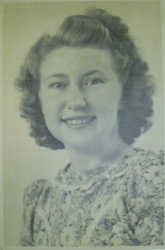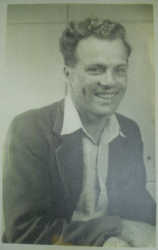The war was nearly over and there was a prospect of freedom and happier days ahead. Meeting Jean was a wonderful change in my fortunes.
How I met Jean
It was in the spring of 1945 that some of us from the camp were taken to the nearest dentist who would accept us. The Taumarunui dentist was the nearest, but the one further away who accepted us was in Taihape. From the camp at Hautu to Taihape was ninety kilometres. The trip went from near Lake Taupo along the scenic Desert Road with three volcanoes to the west, and tussocks and the Kaimanawa Ranges and the bush to the east, followed by travel of more than thirty kilometres to Taihape.
But sadly we saw none of it. We were taken by our “Black Maria” (which is the prisoners’ name for vans which had no windows for us). We were taken to the police cells at Taihape and the six of us were ‘downloaded’ at the dental clinic to fill the reception room , while our driver sat with us as our guard.
The surgeon’s room door opened and an angelic young woman said, “Mr Rogers next.”
I sat in the dental chair and the dentist examined my teeth – after some four years in prisons and camps. Suddenly a bell rang, the nurse went through to the office and returned to say the traveller was here on his three-to-six month visit to re-stock the dental shelves, etc. He must have taken twenty minutes before leaving.
In that precious time when we were alone I told her of ways of writing a coded letter that would pass the censor’s ‘beady’ eye, and we talked and talked. She introduced herself to me as Jean Newport and then showed me a photo of a group of youths and asked me if I knew one Archie Simpson. He was with me some five years earlier when we were both at an Easter Young Men’s Bible Class Camp and we quickly fraternised. Months later Archie joined the army and Jack joined the ‘failed’ C.O.s. Archie was married and released from the army and settled in Taihape where he was choirmaster at Jean’s church.
Listen now to Jean’s story.
On Sunday mornings the family went with their Dad driving to church. After church he called at the Post Office to pick up his mail from his box. He saw Archie and picked him up. As they passed pedestrians Jean noticed him waving to those he knew. Then he waved when no one was there! He explained, “It reminds me of the Mayor of Wanganui who was known to do this.” He added, “He has two sons in Detention Camps.”
Nothing was said, but after lunch Jean got on her bike and opened the surgery door with her key. She remembered that her boss had said, “a few men are coming from a Detention Camp. I have agreed to accept them from Hautu and they will come next Tuesday.” She checked the file and saw the list of patients and there was a ‘Jack Rogers’!
Biking home she stopped at Archie’s to tell him so he could remember his friendship with Jack. Archie said, “I can do better than that.” He gave her a photo of Archie and Jack taken some five years before at the Easter Camp. (She says she picked out the one who could be me – and so it was!)
We exchanged letters in the next five to six months before my release, hoping that the censor would not cotton on to the suddenness of the relationship.
When we were alone in the dental surgery Jean told me that the minister at her church was the Rev Row Rogers, so I addressed my letters for her C/o The Rev R Rogers.
My release
The war was well over by the time I was released. Hautu accommodated 150 C.O.s. Most had left when my turn came. After breakfast a guard took me aside and told me to draw out “Civvies” (own clothes) from the store, and pack up and report to the Super in his office at 9am. The remaining nine C.O.s had gone out to their gangs. After four and a half years I was unable to say goodbye!
The Super had little to say except that a guard would take me to Taumarunui to the railway station and that I was “on parole” – no paper work (which was a bluff). He said I must report to the Wanganui Manpower Office to discuss jobs with them. I was a qualified ‘licensed wireman’. I was not eligible to work for any government job. Nor was I able to work for any electrical contractor because, “much as we need you we have returned servicemen on our staff.” (I had been held in the Trentham Military Barracks for three months mixing in with servicemen who were also in trouble with the Army – and now and again I received a quiet “Good on you mate! Keep it up.”)
At the Super’s office he handed me my ‘wages’ for four and half years which, as I remember, was about twenty pounds when fines and a few purchases were deducted. There was no audited financial statement or paper at all.
The Super opened the door. Outside was a Camp van with a guard at the wheel waiting for me. I sat beside him for the first time. The gates were opened. I was a free man at last.
After the years in prison.
Jean and I were married on 13 December 1947.
 |
 |
Jean and Jack Rogers in 1947
Photo source Jean Rogers |
We are still happily married after sixty years, living in the house we ourselves built in the early years of our marriage and tending a large and fruitful garden. We have four sons, twelve grandchildren and three great grandchildren.
We learnt to value freedom and have enjoyed the freedom of tramping in New Zealand’s beautiful back country. Over twenty years between 1971 and 1991 we completed over twenty tramps covering every section of the mountain traverse from Cape Farewell to Milford Sound. The estimated total distance was 1560 kilometres and the tramping time was 682 hours over 105 days.
I recently celebrated my ninetieth birthday and enjoyed a long walk on the Port Hills above Christchurch.
Related articles
Jack Rogers – Man of peace prepared to suffer for his convictions
Part 1 – Influences and decisions
Part 2 – Jack describes life in the detention camp.
Part 3 – Jack’s own account of “The Mail Run”